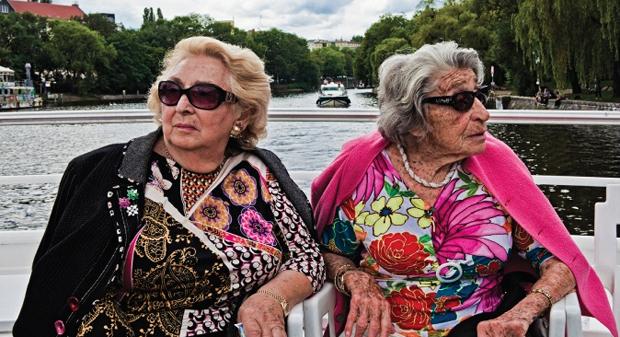‘Oma and Bella’: Two Holocaust Survivors that Preserve Memories in their Berlin Kitchen
Regina Karolinski and Bella Katz. (Photo: Bella Lieberberg)
Saturday marked the first night of the Jewish holiday Hanukkah. Jews around the world celebrated by making “latkes” for the occasion — potato pancakes fried in oil.
Two experts at latke-making are Regina Karolinski and Bella Katz, best friends in their 80s who share an apartment in Berlin. Regina and Bella the stars of a new documentary (and a cookbook) called “Oma and Bella” (Oma for grandmother). The film’s director is Regina’s German-born granddaughter, Alexa Karolinski.
I recently dropped in on Karolinski in her Brooklyn kitchen to talk about the film, and make cookies.
We start by opening up a stick of butter and a package of cream cheese.
“Philadelphia by Kraft. No low fat. It’s full fat everything, and flour,” said Karolinski.
We’re making the dough for “Hagelzuckerkekse” – Regina and Bella’s sugar cookies. The film doesn’t just feature the women cooking desserts; there are also soups, meats, and sauces.
But all this food isn’t German. It’s from Eastern Europe. Regina is originally from Poland, and Bella is from Lithuania. Along with many other Jews from Eastern Europe, they ended up in German camps for displaced persons after World War II. Alexa Karolinski said that most Jews in the DP camps left Germany, but a few thousand stayed on.
“I don’t think it was a conscious decision to stay,” Karolinski said. “I think it was just that they didn’t leave. They all had babies in the displaced persons camp and they all married basically the first person they met after the war and started these new families. I think living life became more important than leaving, but I think they definitely paid the price for staying, psychologically.”
Karolinski said that while Regina and Bella are holocaust survivors, and thus in many ways her movie is a holocaust movie, she didn’t want to tell just another story of what happened during the war. She wanted to focus on their friendship and their strong personalities.
“To me what I wanted to do was make a film in which you can get to know two people who went through this, but who are very much alive today – and to let the past, the dark past trickle in really randomly in the way that memory actually works.”
The past especially trickles in when they are in their shared kitchen in Berlin. As Bella comments in the film, you remember it so vividly when you are cooking.
I wanted to talk to Regina and Bella myself, so after we put the cookie trays in the oven, we got on Skype to call Berlin.
With Karolinski as my interpreter, I asked Regina how she felt about talking about the dark past in the documentary.
“She said that they didn’t want to talk about it for the longest time, but during filming they realized it would be an important document for the future generations,” Karolinski conveyed to me. “It was really hard in the beginning but then they realized that even though it’s hard it might be important to talk about it so it doesn’t get forgotten – and then she asked me immediately after that how I’m doing.”
When we get off the phone, Karolinski looked thoughtful.
“They say they’re happy now. I think they’ve made peace with living in Germany. I also think that the success of the film in Germany and the fact that so many non-Jewish Germans have fallen in love with them and have gotten to know them and they get stopped on the street by people for photos has really come to help them to feel accepted for who they are,” she said.
We take the golden brown cookies out of the oven, the sugar sizzling on top. As Regina and Bella say of the cookies in the film, they look like beauty.
German Sugar Cookies
“HAGELZUCKERKEKSE”
Makes about 40 cookies
1 pack cream cheese (8 oz)
1 stick butter (4oz)
¾ cups flour
1 egg white
1 cup coarse baking sugar
Place the butter in a bowl. If the butter is cold, grate it with a cheese grater so that it mixes easily with the other ingredients. Beat in the cream cheese.
Fold in the flour and mix ingredients well so that they form a dough.
Place the dough on a lightly floured flat surface, and mold it into a ball.
Refrigerate for 2-3 hours, or as long as overnight. Preheat the oven to 350 degrees.
Sprinkle some flour onto a pastry board and roll out the dough until it is about â??th of an inch thick.
Cut out individual cookies using the rim of a small glass.
Beat the egg white in a dish and, using a pastry brush, coat each cookie with it.
Dip the wet side of each cookie into the baking sugar until generously coated.
Bake the cookies on a baking sheet for 25 minutes until golden brown.
After about 20 minutes start to check the cookies. Depending on the oven, they might need an extra 5 to 10 minutes.
